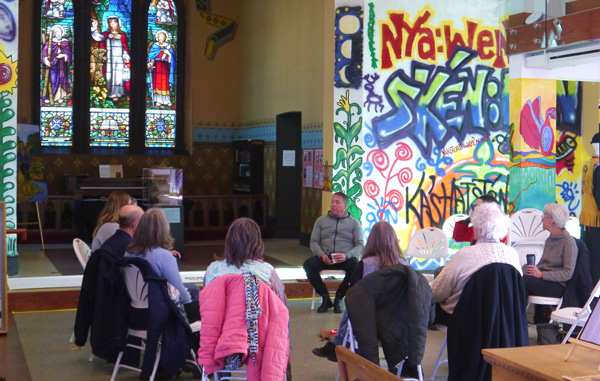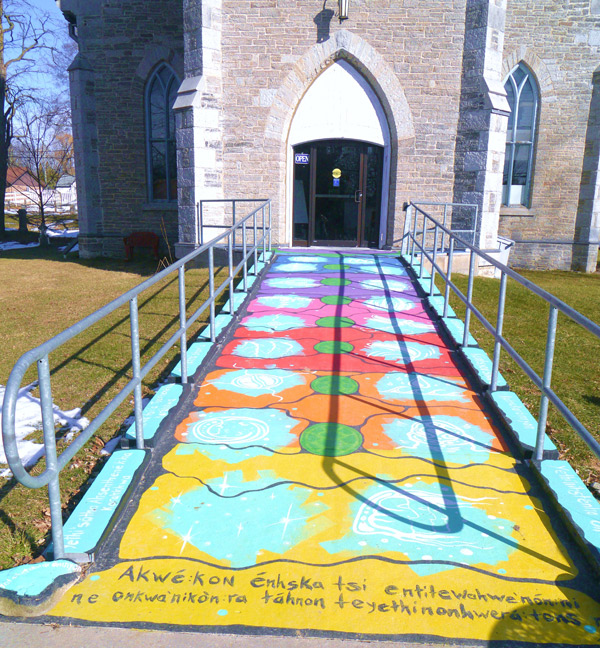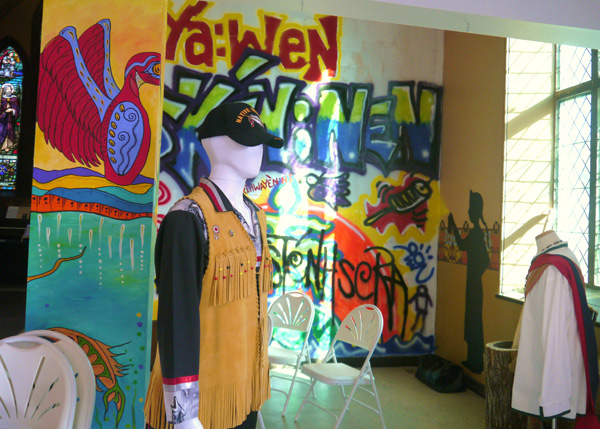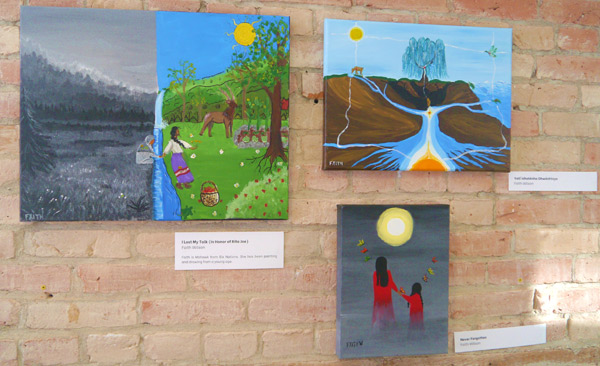Indigenous artist leads conversation circle in A Path Forward exhibit space
Administrator | Mar 02, 2024 | Comments 0
Story and photos by Sharon Harrison
In the final instalment of the annual Flashback February event hosted by County Museums, Picton’s Macaulay Church welcomed JP Longboat with ‘Canoe Stories’.
Running concurrently at the museum is the A Path Forward exhibit, which Jessica Chase, museums curator, explained is an expansion of the Indigenous History exhibition that has run at the museum since 2019.
The exhibit talks about the history of indigenous peoples in Prince Edward County, also bringing it in the present as well. It also incorporates some contemporary Indigenous art work.
“Obviously, the theme of A Path Forward is looking at what our collective future looks like in Prince Edward County as Indigenous and non-Indigenous people living in this place, which is why Canoe Stories is relevant and this is a good place to have this conversation,” said Chase.
The free of charge event, a project in collaboration with Flight Festival, saw only about eight participants, and didn’t see the presenter share much in the way of stories, canoe or otherwise, as suggested by the event title.
The format was largely that of listening to each member of the group share their thoughts and feelings, primarily centred around their personal perspective of what the indigenous histories of Prince Edward County are (although many expanded and deviated from the theme), where each took a turn to speak, all while holding a golden eagle feather, where the process repeated several times (based on the circle of when you have the feather, you have the floor).
The very small group shared in this collective journey of discovery through cultural stories of place, where the idea was to learn more about the region from the First Nations’ perspective.
Arwyn Carpenter, who identified as a dancer, is one of the creative directors with the flight dance festival, which focuses on contemporary dance, education, community work, but also “very much sharing the land, and work that comes from the land”.
“We have to ask why Prince Edward County, why contemporary dance, why contemporary dance here in this particular place, so that questioning brought us in contact with JP Longboat who is a dance choreographer and multi-disciplinary artist,” said Carpenter.
Longboat travelled from his home in Ottawa and spoke to his background and education, which included later in his artistic practice, dancing choreography, before that theatre, and before that visual art.
“But I realized, I am a person that is very motivated to reclaim our stories, as a cultural person of oral people, that means we tell stories, our histories, in that way,” said Longboat.
“I am also new to my own territory in a sense. I didn’t know the history of Prince Edward County; I didn’t know the history of the area around in Kingston. In a lot of perspectives, we are on reserves, the Six Nations, that’s where I’m from.” (he indicated earlier he is Mohawk, Turtle Clan).
“As an artist, as I move through these different disciplines, realizing more and more the craft of storytelling, and being a storyteller, and wanting to do that in different ways, that I was having these experiences on the land, where I was travelling and I would feel something on the land, like an empathetic experience,” explained Longboat.
He said one of the strongest experiences he had was at Carrying Place. (The intersection of the Trenton and Carrying Place roads was designated a national historic site of Canada in 1929 marking September 1787, when Sir John Johnson and Chiefs of the Mississauga negotiated for the ceding of lands enclosing a river and portage route between Lake Ontario and Lake Huron.)
“I’m from Six Nations and I live in Ottawa, so I’m back and forth a lot, very strong emotional connections, very strong emotional experiences over there by the Carrying Place,” he continued. “And I was so curious about it, what the heck is this, what is going on, why I am so emotional at this place?”
Chase provided a little background on the setting, explaining the history of Macaulay Church , noting how some of the building dates back to the 1820s, with extensions to the property coming some 50 years later.
Macaulay Church, located on Church Street in Picton, is the original St. Mary Magdalene Anglican Church, where a more recent building was constructed on Main Street, in 1912, to cater to the growing congregation (but keeping the same name).
“They did maintain this church (the original) for the next 50 years through volunteer contributions, and by the 1960s there was just too much to do with it,” explained Chase. “They would have one mid-summer service a year just to keep it active, but for the most part, it was just used for storage.”
After the roof fell in and was repaired (in the 1920s), and then generally falling into disrepair, the building was given to the municipality in 1967, where it took six years to complete restorations, and was officially opened in 1974, she said.
 While the presence of a reporter at this event was expected, then not particularly welcomed by the group, it was difficult to produce a fulsome story due to requests to not identify participants or specific details shared, but some of the general gist of conversational topics focused on land, water, sharing and conversation.
While the presence of a reporter at this event was expected, then not particularly welcomed by the group, it was difficult to produce a fulsome story due to requests to not identify participants or specific details shared, but some of the general gist of conversational topics focused on land, water, sharing and conversation.
Participants in the circle each spoke to what the land means to them, sometimes specific to where they reside or a place with meaningful memories, and what that means to them, identifying the beauty of the land and the joy it brings, some highlighted the smells of the land, as observances of surroundings were divulged.
Contributors to the conversation shared thoughts of what resonates with them, sharing stories or thoughts of reconciliation, and what that they may mean.
Water came in the sharings, how precious it is, the importance of clean and plentiful water, and our connection to the water. There was concern for the largest freshwater lakes in the world, their health and prosperity; disappearing wetlands and development.
“We are made of water, we all need water; it is the essence of life,” said one participant.
Others spoke to the influence on people on lives, one was there for anything that advances reconciliation. Another spoke to personal and community health being an important aspect, a sense of identity and sense of belonging. There were stories about ancestors, and the voices of ancestors, and discussion on coming together, and how people can change the world.
“That’s what this is about, reclaiming that process of dialogue,” said Longboat. “The other piece as well that we are interested in is the process that we talk about, is retracing how we move on the land; how we move on the land constitutes our relationship with the land, and with one another as well, where we share that land.”
“Abundance of territory, that is to be respected, and that no one takes more than they need,” he added, “and I believe it is about sharing, it’s about understanding and how to share and being respectful.”
A continuation of the circle conversation, in a similar format, is planned for April and May.
Filed Under: Arts & Culture • Featured Articles • News from Everywhere Else
About the Author:


































